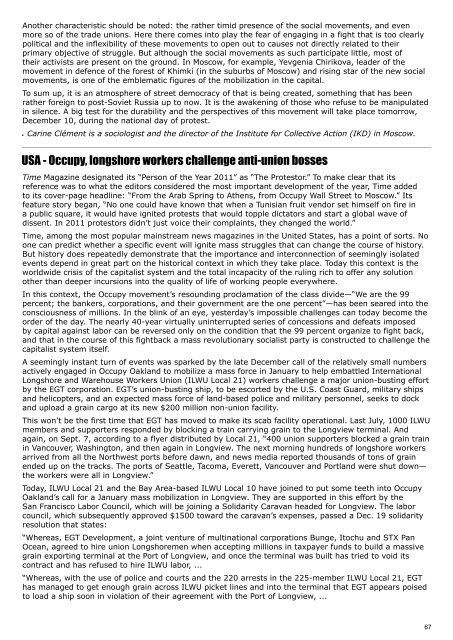download - International Viewpoint
download - International Viewpoint
download - International Viewpoint
You also want an ePaper? Increase the reach of your titles
YUMPU automatically turns print PDFs into web optimized ePapers that Google loves.
Another characteristic should be noted: the rather timid presence of the social movements, and even<br />
more so of the trade unions. Here there comes into play the fear of engaging in a fight that is too clearly<br />
political and the inflexibility of these movements to open out to causes not directly related to their<br />
primary objective of struggle. But although the social movements as such participate little, most of<br />
their activists are present on the ground. In Moscow, for example, Yevgenia Chirikova, leader of the<br />
movement in defence of the forest of Khimki (in the suburbs of Moscow) and rising star of the new social<br />
movements, is one of the emblematic figures of the mobilization in the capital.<br />
To sum up, it is an atmosphere of street democracy of that is being created, something that has been<br />
rather foreign to post-Soviet Russia up to now. It is the awakening of those who refuse to be manipulated<br />
in silence. A big test for the durability and the perspectives of this movement will take place tomorrow,<br />
December 10, during the national day of protest.<br />
Carine Clément is a sociologist and the director of the Institute for Collective Action (IKD) in Moscow.<br />
USA - Occupy, longshore workers challenge anti-union bosses<br />
Time Magazine designated its “Person of the Year 2011” as “The Protestor.” To make clear that its<br />
reference was to what the editors considered the most important development of the year, Time added<br />
to its cover-page headline: “From the Arab Spring to Athens, from Occupy Wall Street to Moscow.” Its<br />
feature story began, “No one could have known that when a Tunisian fruit vendor set himself on fire in<br />
a public square, it would have ignited protests that would topple dictators and start a global wave of<br />
dissent. In 2011 protestors didn’t just voice their complaints, they changed the world.”<br />
Time, among the most popular mainstream news magazines in the United States, has a point of sorts. No<br />
one can predict whether a specific event will ignite mass struggles that can change the course of history.<br />
But history does repeatedly demonstrate that the importance and interconnection of seemingly isolated<br />
events depend in great part on the historical context in which they take place. Today this context is the<br />
worldwide crisis of the capitalist system and the total incapacity of the ruling rich to offer any solution<br />
other than deeper incursions into the quality of life of working people everywhere.<br />
In this context, the Occupy movement’s resounding proclamation of the class divide—“We are the 99<br />
percent; the bankers, corporations, and their government are the one percent”—has been seared into the<br />
consciousness of millions. In the blink of an eye, yesterday’s impossible challenges can today become the<br />
order of the day. The nearly 40-year virtually uninterrupted series of concessions and defeats imposed<br />
by capital against labor can be reversed only on the condition that the 99 percent organize to fight back,<br />
and that in the course of this fightback a mass revolutionary socialist party is constructed to challenge the<br />
capitalist system itself.<br />
A seemingly instant turn of events was sparked by the late December call of the relatively small numbers<br />
actively engaged in Occupy Oakland to mobilize a mass force in January to help embattled <strong>International</strong><br />
Longshore and Warehouse Workers Union (ILWU Local 21) workers challenge a major union-busting effort<br />
by the EGT corporation. EGT’s union-busting ship, to be escorted by the U.S. Coast Guard, military ships<br />
and helicopters, and an expected mass force of land-based police and military personnel, seeks to dock<br />
and upload a grain cargo at its new $200 million non-union facility.<br />
This won’t be the first time that EGT has moved to make its scab facility operational. Last July, 1000 ILWU<br />
members and supporters responded by blocking a train carrying grain to the Longview terminal. And<br />
again, on Sept. 7, according to a flyer distributed by Local 21, “400 union supporters blocked a grain train<br />
in Vancouver, Washington, and then again in Longview. The next morning hundreds of longshore workers<br />
arrived from all the Northwest ports before dawn, and news media reported thousands of tons of grain<br />
ended up on the tracks. The ports of Seattle, Tacoma, Everett, Vancouver and Portland were shut down—<br />
the workers were all in Longview.”<br />
Today, ILWU Local 21 and the Bay Area-based ILWU Local 10 have joined to put some teeth into Occupy<br />
Oakland’s call for a January mass mobilization in Longview. They are supported in this effort by the<br />
San Francisco Labor Council, which will be joining a Solidarity Caravan headed for Longview. The labor<br />
council, which subsequently approved $1500 toward the caravan’s expenses, passed a Dec. 19 solidarity<br />
resolution that states:<br />
“Whereas, EGT Development, a joint venture of multinational corporations Bunge, Itochu and STX Pan<br />
Ocean, agreed to hire union Longshoremen when accepting millions in taxpayer funds to build a massive<br />
grain exporting terminal at the Port of Longview, and once the terminal was built has tried to void its<br />
contract and has refused to hire ILWU labor, ...<br />
“Whereas, with the use of police and courts and the 220 arrests in the 225-member ILWU Local 21, EGT<br />
has managed to get enough grain across ILWU picket lines and into the terminal that EGT appears poised<br />
to load a ship soon in violation of their agreement with the Port of Longview, ...<br />
67









